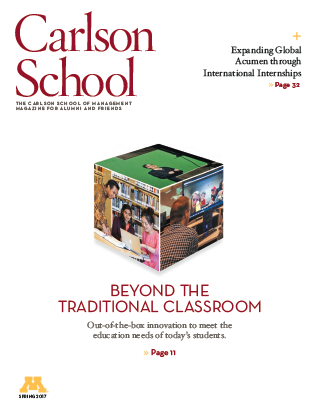
Beyond the Traditional Classroom: Tailored Courses
Tuesday, July 25, 2017
Programs more tailored to a student’s career interest continue to proliferate. In just the last few years, the Carlson School has created a Master of Science in Business Analytics—offered both full and part time—a Master of Science in Finance, a Master of Science in Supply Chain Management, and an Industry MBA based in Washington, D.C. More than 165 students are enrolled in these programs.
For undergraduates, a brand-new minor is now being offered jointly by the Carlson School and the Law School: Business Law. This minor is open to all undergraduate degree-seeking students on the Twin Cities campus, including Carlson School students. Those enrolled in this minor will explore issues and concepts at the intersection of law and business and learn analytical techniques helpful in business settings.
“Law plays a central role in the world of American business,” says Dorsey & Whitney Chair in Law Brett McDonnell. “Sometimes it provides structures that help businesses advance their goals, and sometimes it provides important limits on what they can do.” He says anyone who wants to be involved in the world of business—or simply just wants to understand how that world works—should have some understanding of business law. “It is not just lawyers and law students who need to think about business law,” he says. “The Law School is filled with faculty and courses that advance our understanding of business law, and this program makes some of those courses available to students outside of the Law School.”
This minor will leverage the expertise of the Carlson School and the Law School by offering experienced advising, a foundation in substantive business law, and instruction in legal reasoning. “A business school or law school could not alone provide the combination of resources that this partnership makes available to students,” says Law Professor Allan Erbsen. “Students will learn analytical techniques and legal rules that will be helpful in business settings and that can prepare them for further study in a law school or an MBA program.”
The program contains both substantive and procedural elements. Substantially, students will learn important aspects of business law, including the basic background of the American legal system, the law of corporations and other business associations, legal elements of accounting and corporate finance, and other areas such as tax, intellectual property, and financial regulation. “Procedurally, we want to teach students how law students and lawyers think and how they research and analyze problems,” McDonnell says.
Several kinds of students will find this program useful. “Some will be planning on going to law school. For them, it will give a chance to get a head start in learning how law students and lawyers think about problems,” says Associate Professor and John and Bruce Mooty Chair in Law & Business Paul Vaaler. “Some will be planning to go into the world of business. For them, the program will help guide the understanding of important legal rules which both enable and constrain businesses.” For everyone, he adds, the program will help develop an understanding of the role law plays in shaping the environment in which businesses function.
Evolving Executive Education
Finally, what about seasoned employees? How can they take advantage of the educational offerings of today? Because technology is rapidly rewriting the rules while competitive intensity continues to increase, companies are increasingly looking for partners and programs to help them quickly evolve. These programs must enable participants to immediately apply what they have learned, and often include tools, frameworks, and action-learning projects.
“Leaders are recognizing that the firms that are able to successfully adopt these new approaches will earn a competitive advantage in the marketplace,” says Carlson Executive Education Executive Director Jody Tableporter. “Firms are also recognizing that the fast rate of external change requires their leaders and teams to quickly adapt and evolve internally.”
Two new Carlson Executive Education courses will meet this need by helping senior leaders plan, execute, and sustain “change” and “innovation” initiatives. Additionally, shifts in the workforce are requiring Millennials to step up into management roles faster than ever before. To help prepare them to take on these new challenges, Executive Education has created a course specifically for emerging leaders.
“And even the most seasoned of leaders are looking to Carlson Executive Education to continue their development at key transition points,” Tableporter says. “New and aspiring CFOs will learn how to create shareholder value, communicate with boards and analysts, and lead under the spotlight in a newly created program called Leading Finance.”
